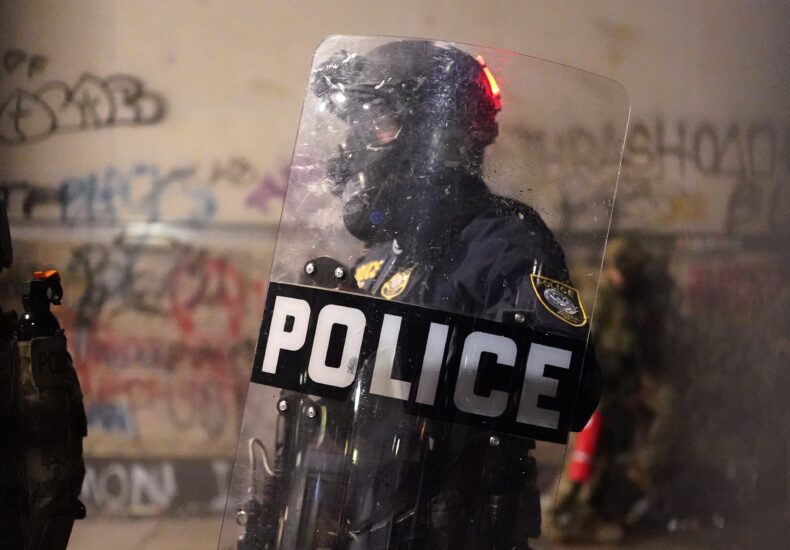
Trump’s Federal Cops Just Gave Themselves Expansive Anti-Protest Powers Targeting Masks
**DHS Accelerates Regulation Changes, Expanding Powers of Little-Known Federal Police Force**
Citing “civil unrest” in American cities, the Department of Homeland Security (DHS) has accelerated new regulations meant to expand the powers of a little-known federal police force. The new rules drew scant notice when they were first proposed during the final days of the Biden administration. Now, using language about “rioters” at federal facilities, the Trump administration is fast-tracking the rule changes—moves critics say DHS could use as a pretext to go after protesters, even for activities as innocuous as wearing frog costumes or making noise on the streets of cities like Chicago and Portland, Oregon.
**Expanding the Federal Protective Service**
The new regulations could empower the Federal Protective Service (FPS), a lesser-known police force under DHS tasked with securing federal facilities, to make more arrests outside of federal property itself. The FPS has played a prominent role in Trump’s crackdown on Democratic-majority cities, where protests against U.S. Immigration and Customs Enforcement have, at times, led to harsh crowd dispersal tactics and arrests.
“It is clear that DHS sees what is in this regulation as a go-ahead to operate well off federal property, including potentially in private homes and businesses,” said Spencer Reynolds, a former Homeland Security lawyer turned critic. “We are seeing that play out on U.S. streets. Federal agents are taking a really aggressive hand to protesters who are largely peaceful.”
**Criminalizing Protesters Wearing Masks**
Among the new rules is the criminalization of protesters wearing masks. Although the mask ban is ostensibly limited to those concealing their identity during a crime, the Trump administration has taken an expansive view of criminal behavior in protests, including activity traditionally protected by the First Amendment.
DHS said in a written filing this week that it was bypassing the standard notice process and expediting the new rules by two months, responding to a “cascade of violence, which is threatening the lives of federal law enforcement officers and the safety of federal property on a daily basis.” On Wednesday, the agency announced the expedited changes.
“Under President Trump and Secretary [Kristi] Noem, we will not tolerate violence perpetuated by Antifa and other domestic extremists who are targeting federal property and law enforcement. Law and order will prevail,” stated Homeland Security Assistant Secretary for Public Affairs, Tricia McLaughlin.
The FPS also has the authority to deputize agents from Customs and Border Protection and ICE to enforce these new regulations, which carry the full force of law.
**Rushed Rule Change Process**
When DHS first proposed the new regulations on January 15—just five days before Trump’s inauguration—they attracted little attention. Only one person submitted feedback during the rule-making process, likely because the FPS has typically operated under the radar. With around 900 officers, the agency is charged with protecting thousands of federal buildings and their grounds, a mission and staffing that expanded notably after the 1995 Oklahoma City bombing and the September 11 attacks.
DHS painted the new rules as mostly bureaucratic housekeeping. In reality, they may provide the administration new tools to pursue protesters, a fact the department seemed to acknowledge in the recent notice moving up their effective date. “DHS finds that there is ‘good cause’ to bypass notice-and-comment rulemaking and a delayed effective date, because such procedures are impracticable here,” the agency said. “There is an immediate need for DHS to move up the effective date of the June 2025 rule because of the recent increase in civil unrest, targeting of federal law enforcement officials, and destruction of federal property across U.S. jurisdictions.”
**Broadening Enforcement Powers**
The new rules expand the number of buildings where the FPS can issue citations and create new misdemeanor categories. Most notably, they also appear to expand the force’s ability to pursue investigations and enforce violations of “off-property misconduct.” Under previous rules, unless there was a specific federal statute or a memorandum of understanding allowing DHS to enforce state and local laws, the agency’s hands were largely tied for activities taking place off federal property.
The January DHS statement said these changes would “fill the void where there is no applicable federal statutory charge… and no [memorandum of understanding] permitting DHS to charge state or local offenses.”
**Unmasking Protesters—and Risk of Abuse**
Newly banned “off-property” activities include wearing disguises, creating loud noises that disrupt government employees, and blocking entrances or exits to federal property. While some of this conduct was already forbidden on federal grounds, the mask provision is entirely new.
DHS maintains the mask ban is “expressly limited to instances when a person is concealing his/her identity to avoid detection while violating an applicable law.” Still, critics see potential for widespread abuse.
“There is a significant risk that this will become another basis for targeting activists who may be wearing masks or full-body frog costumes, as we have seen in the past few months,” said Reynolds, who now serves as senior counsel in the Brennan Center’s Liberty & National Security Program. “It gives another justification for federal agents to build a questionable narrative that these people are dangerous, and also for them to incorporate that in citations and criminal charges.”
**Legal Limits and Potential Pushback**
The new regulations are part of a broader Trump administration push to unleash the FPS. According to a recently leaked memo, DHS’s acting general counsel stated there is “no legal barrier to FPS taking action off federal property where a reasonable nexus to protecting that property exists.”
Despite these assertions, constitutional limits remain. “Whatever powers the Trump administration may have, or think it has, or tries to give itself, it can’t authorize the use of excessive force, it can’t stop people from exercising their right to free speech, and it can’t stop reporters from reporting on what’s happening at federal properties,” said Athul Acharya, executive director of the Portland-based nonprofit law firm Public Accountability.
**Background: Trump’s Crackdown Cops**
Since Trump’s first term, the FPS has stood at the center of legal debates over federal authority to intervene in defiant American cities. In 2020, FPS officers faced off with demonstrators in Portland during racial justice protests, bolstered by deputized Border Patrol agents—a response that included grabbing people off the street in unmarked vans.
In Los Angeles, FPS officers were accused of instigating a confrontation with abortion rights protesters far from the federal courthouse. More recently, the Justice Department was caught overstating the number of FPS officers involved in this year’s protests against mass deportations, an apparent attempt to bolster the argument for deploying the National Guard.
Reynolds has called for limiting FPS powers to avoid political repression, recognizing the difficulty of enacting such changes with the current Congress. In the meantime, he suggests that local governments can take meaningful steps, such as limiting data sharing with federal agencies.
“Cities and states,” Reynolds said, “are absolutely in their right to opt out from helping the Federal Protective Service and other agencies go after their residents who are protesting and expressing dissent.”
https://theintercept.com/2025/11/06/trump-federal-protective-service-protests/
You may also like
参考资料
You may be interested
Globe bets on prepaid fiber, sets expansion
No content was provided to convert. Please provide the text...
Bragging rights up as Samal makes 5150 debut
A stellar Open division field will be shooting for the...
DigiPlus launches P1-M surety bond program
MANILA, Philippines — DigiPlus Interactive Corp. has partnered with Philippine...
 The New York Times
The New York Times
- Epstein Files Reveal Efforts to Build Ties With Russian Officials, Including Putin 2026 年 2 月 10 日 Steven Lee Myers and Nataliya Vasilyeva
- How the Israeli President’s Visit to Australia Created a ‘Tinder Box’ 2026 年 2 月 10 日 Victoria Kim
- A.I. Personalizes the Internet but Takes Away Control 2026 年 2 月 10 日 Brian X. Chen
- Mamdani Hires Groundbreaking Computer Scientist as Chief Tech Officer 2026 年 2 月 10 日 Jeffery C. Mays
- Pride Flag Is Removed From Stonewall Monument After Trump Directive 2026 年 2 月 10 日 Liam Stack, Jonathan Wolfe and Yan Zhuang
- Epstein Used Cash to Wield His Influence at Columbia and N.Y.U. 2026 年 2 月 10 日 Sharon Otterman
- Susan Collins Runs for Re-election, in One of 2026’s Top Senate Fights 2026 年 2 月 10 日 Reid J. Epstein
- Hamas Would Keep Some Weapons Initially in Draft Gaza Plan 2026 年 2 月 10 日 Adam Rasgon, Natan Odenheimer and Abu Bakr Bashir
- The Ties That Bound the UK’s ‘Prince of Darkness’ Peter Mandelson to Jeffrey Epstein 2026 年 2 月 10 日 Michael D. Shear and Jane Bradley
- NLRB Dismisses Case Brought by Fired SpaceX Employees 2026 年 2 月 10 日 Noam Scheiber and Ryan Mac



Leave a Reply